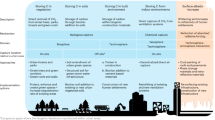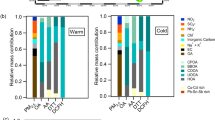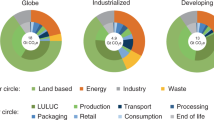Abstract
TYPICAL air samples contain particulate air contaminants in concentration of 100–2,000 (µg/m3. Standard methods for analysing the composition of these contaminants are tedious and often insensitive1. The application of activation analysis for the inorganic elements appears to be attractive as a fast, sensitive and highly specific method. Preliminary irradiations of samples collected on filter paper have been performed and have shown that the method is feasible. Identification of several radioactive species has been accomplished, and quantitative estimates have been made. One problem has been that the filter paper as well as the contaminants activate, necessitating the irradiation of a control sample to correct for the effect.
This is a preview of subscription content, access via your institution
Access options
Subscribe to this journal
Receive 51 print issues and online access
$199.00 per year
only $3.90 per issue
Buy this article
- Purchase on Springer Link
- Instant access to full article PDF
Prices may be subject to local taxes which are calculated during checkout
Similar content being viewed by others
References
Katz, M., et al., Anal. Chem., 30 (1958).
Author information
Authors and Affiliations
Rights and permissions
About this article
Cite this article
PARKINSON, T., GRANT, L. Activation Analysis of Particulate Air Contaminants. Nature 197, 479–480 (1963). https://doi.org/10.1038/197479a0
Issue Date:
DOI: https://doi.org/10.1038/197479a0
This article is cited by
-
A review on activation analysis of air particulate matter
Journal of Radioanalytical and Nuclear Chemistry Articles (1985)
-
The radioanalytical bibliography of USA (1936–1977)
Journal of Radioanalytical Chemistry (1981)
Comments
By submitting a comment you agree to abide by our Terms and Community Guidelines. If you find something abusive or that does not comply with our terms or guidelines please flag it as inappropriate.



